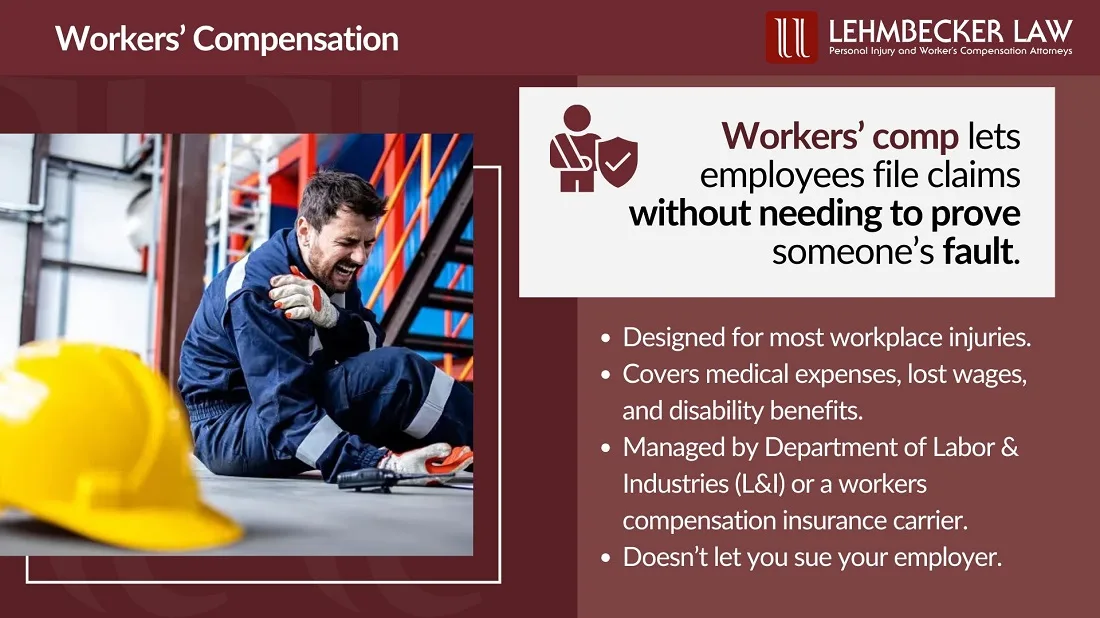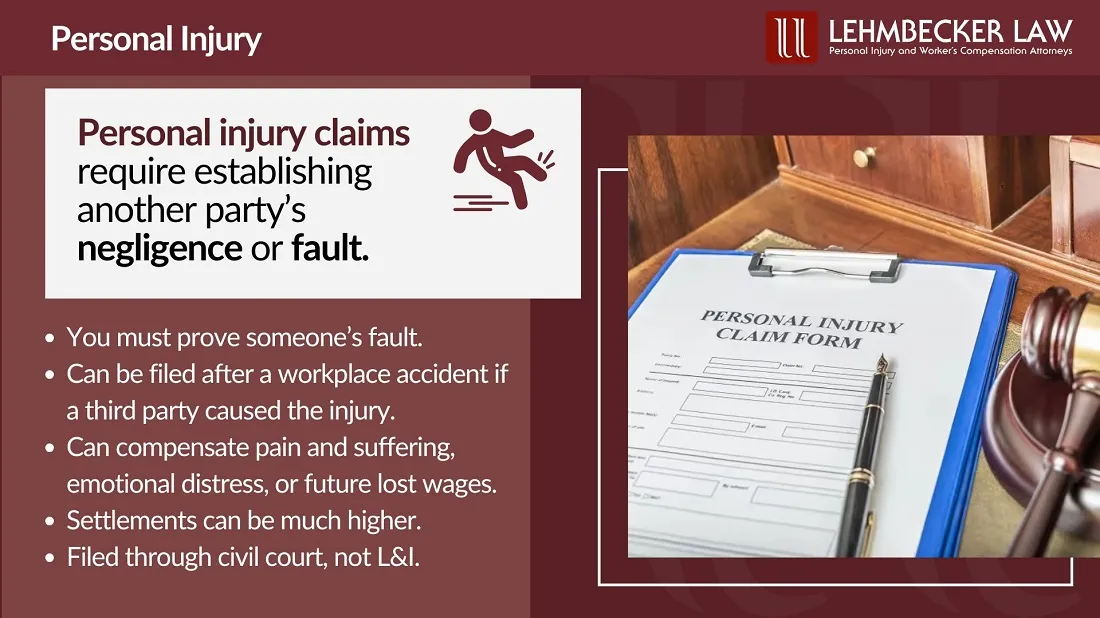There is no fee unless we win!
EN

- EN
- ES


Most people know that you file for workers' compensation benefits if you get hurt on the job. Workers’ comp will make sure your medical bills are paid, and you’ll get wage benefits while you’re off work and healing. But many people may not know that, depending on the facts of your case, you might be able to file a personal injury lawsuit along with your workers’ comp claim. The benefit of doing this is potentially receiving much more money for your injuries.
This article will discuss the differences between workers’ compensation and personal injury claims in Washington State so you can understand the benefits of filing both, if possible.
First, what is the difference between workers’ compensation and personal injury?

Workers' compensation operates on a no-fault system. Employees can file a claim without having to prove that their employer or coworkers were negligent. The primary requirement is that the injury occurred during employment and was connected to the work performed.

In contrast to workers' compensation, personal injury claims require the injured party to establish another party's negligence or fault. This means showing that a duty of care was breached, directly causing the injury (for example, if the injury was caused by unsafe conditions on a property where a delivery driver stopped, such as a slip and fall on a wet floor without proper signage).
So, through workers’ comp, you can get medical care, lost income, and maybe permanent disability benefits. A personal injury lawsuit, on the other hand, lets you pursue broader damages, but only when someone else’s negligence caused your injury.
Washington (like most states) follows the "exclusive remedy rule", which means that if your employer provides workers’ compensation insurance, you cannot sue them for a workplace injury — even if they were negligent. This is the tradeoff: you don’t have to prove fault to get benefits (even if you were negligent and caused your injury), but you also give up the right to sue your employer directly for damages like pain and suffering.
Some workers aren’t covered by standard workers’ compensation laws and can sue their employers directly. Two notable examples are crew members of vessels and interstate railroad workers, who are covered under different federal laws.
Crew members on any type of vessel are covered under the Jones Act, not state workers' comp. This federal law lets them sue their employer for negligence if they're injured on the job — and recover damages like medical expenses, lost wages, and pain and suffering.
Similarly, interstate railroad workers are not covered by state workers’ comp systems. They fall under the Federal Employers Liability Act (FELA), which also permits lawsuits against employers for job-related injuries. Unlike the no-fault system of workers’ comp, FELA requires the injured worker to prove that the employer — in this case, the railroad — was at least partially negligent in causing the injury.
In most cases, if you’re an injured employee, you’ll file a workers comp claim with your employer’s insurance. Washington law requires almost all employers to provide workers' compensation insurance, and the system is set up to handle everything from slips and falls to repetitive stress injuries.
Workers’ comp usually covers:
You can receive workers' compensation benefits even if the injury was your own fault — that’s the tradeoff for giving up the right to sue your employer.
However, not every person in the workforce is covered. Generally, to be eligible for workers' compensation, you must be classified as an employee. In Washington, certain types of independent contractors, freelancers, and volunteers do not qualify. Some 1099 workers qualify, however, depending on the nature of their work.

If someone other than your employer caused your workplace injury, you may have the right to file a personal injury lawsuit. This is often called a third-party claim — and it can significantly increase the amount of compensation you receive.
Examples of third-party liability include:
These cases let you recover:
Compensation from a personal injury lawsuit has the potential to be much higher than that for a workers' compensation claim.
Yes — in some cases, you can file a workers’ comp claim and a personal injury lawsuit at the same time. For example, if a third party caused your work-related injury, you can collect workers' comp benefits through your employer’s insurance and pursue a separate personal injury claim against the at-fault party.
Just know that L&I (your employer’s insurer) may seek reimbursement from your personal injury settlement if they’ve already paid for your medical care. This is called subrogation, and it’s something a workplace injury lawyer can help you navigate.

First, you must notify your employer of the injury as soon as possible. Failing to notify them could jeopardize your benefits.
After notifying your employer, you have one year to file a formal workers' compensation claim. This deadline starts from the date of the injury.
Personal injury claims generally allow a longer period to initiate legal action. In Washington, you have three years from the date of the injury to file a lawsuit. This time limit applies to most types of personal injury cases, including auto accidents, slip and falls, and defective products.
Deciding between filing a workers' compensation claim or a personal injury lawsuit depends on the specifics of your situation, including the nature of your injury and how it occurred.
If you’ve suffered a workplace injury and you’re unsure what path to take, contact Lehmbecker Law today. Our Seattle personal injury attorneys have decades of experience and are ready to help you determine the best course of action and fight for the justice and compensation you are entitled to.

Whether you’re dealing with medical bills, lost income, or long-term pain, we’ll help you fight for the fair compensation you deserve.
No. Workers' compensation does not cover non-economic damages like pain, emotional distress, or loss of enjoyment of life.
You can receive workers' comp benefits and file a third-party claim.
Start with workers' compensation to get treatment going. Then, consider contacting our experienced personal injury attorneys so we can investigate the incident and determine if a third-party lawsuit is possible.
Usually, you can’t file a workers' compensation claim, but you might still have a personal injury case. In some situations, employers misclassify employees to avoid paying workers’ comp. If that’s happened to you, you may be eligible for workers’ comp benefits. Contact our Washington workers’ comp lawyers for honest answers about whether you should be considered an employee or independent contractor after a work injury.